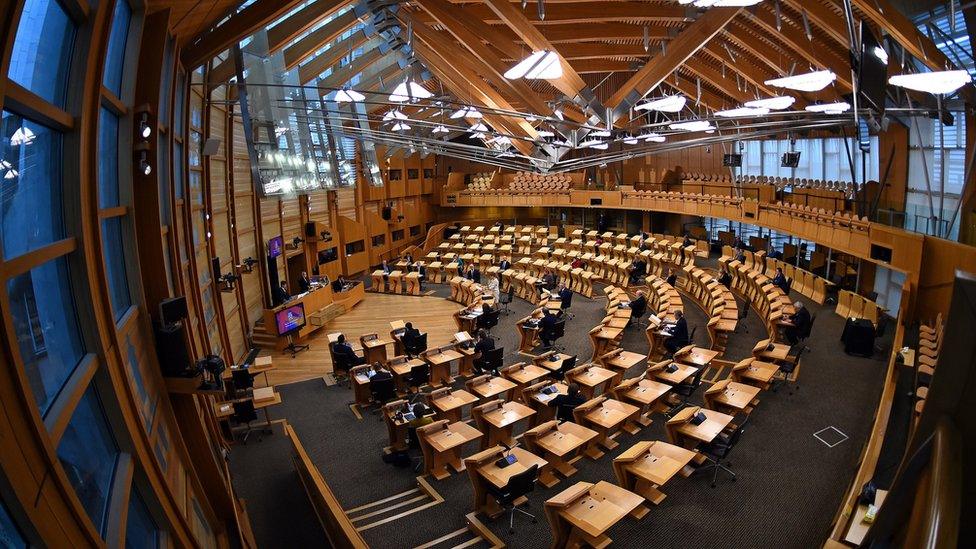Scotland's reputation ranked in international survey
- Published

Scotland punches well above its weight simply for being known around the world
Scotland is included in a survey of 50 countries, measuring how their reputations compare. Improvement is one of the targets for Scottish government ministers.
The measures have held steady, but slipped one place on the league table, while the UK has improved to second place, and the US's reputation has slumped.
The survey results, published by the Scottish government last week, also measure what Scots think of their own country. There's only one count on which Scots rate themselves badly.
Events at Holyrood have sparked some discussion of whether Scotland's reputation is at risk, or merely that of some of its politicians.
It's impossible to know. Brands and reputation are intangible assets, and notoriously hard to pin down. In the law of defamation, a reputation is judged against the "estimation of a right-thinking member of society generally".
Some claim to be able to put a value on reputation. Brand consultants make a good living out of doing so. While Apple sits atop global brands, followed by Amazon, Google, Microsoft and Samsung, Scotland's strongest commercial contender is Johnnie Walker, making it just inside Interbrand's world top 100.
What about nations, though? Whose nation is best? Many places have their own way of voicing the Scottish brag: 'wha's like us?' (The traditional response: 'Damn few, and they're a' deid.')
We learned this week that 16 nations can claim to answer that question: 'We are - only better, and we have survey evidence to prove it'.

Ministers take a close interest in how the country's reputation is faring
This is the Anholt-Ipsos survey of 50 nations, asking how they rate on a number of metrics. The Scottish government takes a close interest to find out how it's faring, as the nation's international reputation is one of the outcomes on which Scottish ministers measure themselves.
For six pulses of the survey over the past decade, it seems that Scotland's reputation as the place for tourism, investment mixed with immigration, culture, governance, people and exports is holding up, but not quite keeping pace with others. The survey results released last week show it slipping one place, to number 17 out 50.
The survey showed Scotland scored best as a tourist destination, and was in the top 20 for five of the six categories of reputation. That at least suggests consistency is one of its strengths. It fell into a lower ranking only for its exports.
Stereotypes and scenery
How is this measured? A weighted survey of more than 20,000 people across 18 nations. Neither knowledge nor expertise seem to be required.
It's probably harder to get firm opinions about Panama, Botswana, Qatar or Taiwan, so they start with that disadvantage.
For its size, Scotland punches well above its weight simply for being known, even if it's often for stereotypes, its scenery, whisky, Nessie and Auld Lang Syne.

Whisky plays a global role in underlining brand Scotland
It is larger nations which do better in this reckoning. Last year's survey found Germany came top for the fourth time in a row.
We're told that "global citizens have positive feelings about buying German products, the employability of the German people, and the appeal of investing in German businesses, placing Germany first in all three categories for 2020".
The UK moved up from fourth to second place, while Canada remained in third. Japan moved up to fourth, France dropped to fifth, its lowest ranking so far.
Italy and Switzerland moved up one place each to sixth and seventh positions. Australia moved from 10th to 8th slot, the highest position it has reached, and Sweden remained at number nine.
Reputation Top Trumps
Being big and well-known, with desirable consumer products, is no guarantee of a strong reputation: the US last year dropped, on this count, from number six to 10.
Americans previously held the top spot on seven occasions since 2009, but they have taken a dive in their global reputation. Maybe it was just coincidence that this followed the 2016 presidential election.
China also suffered a decline down the rankings last year, from 23rd to 35th place.
What was going right for the UK, for it to move up to second position behind Germany?
After being third or fourth for several years, it scored strongly for its exports, attitudes to immigration and investment, and it enjoyed an improved perceptions of its governance, culture, people, and tourism.
(Please don't complain to me if you disagree: instead, take your evidence to the 20,000 people questioned. This is, you'll note, about their perceptions rather than evidenced reality.)
Failure to qualify
The survey, carried out every two years, also tracks Scots' view of themselves.
Over a decade and six surveys, Scots view of their country fell below number one only in 2016, when it was beaten by the UK and Canada.
Hmm... what might have been happening between 2014 and 2016 to explain that? Answer that one according to your political taste.
Regaining that top spot in 2018, it was confirmed in the most recent, 2020 survey.
The one area in which Scots take a particularly dim view of themselves and their country is that of 'excellence in sport'.
